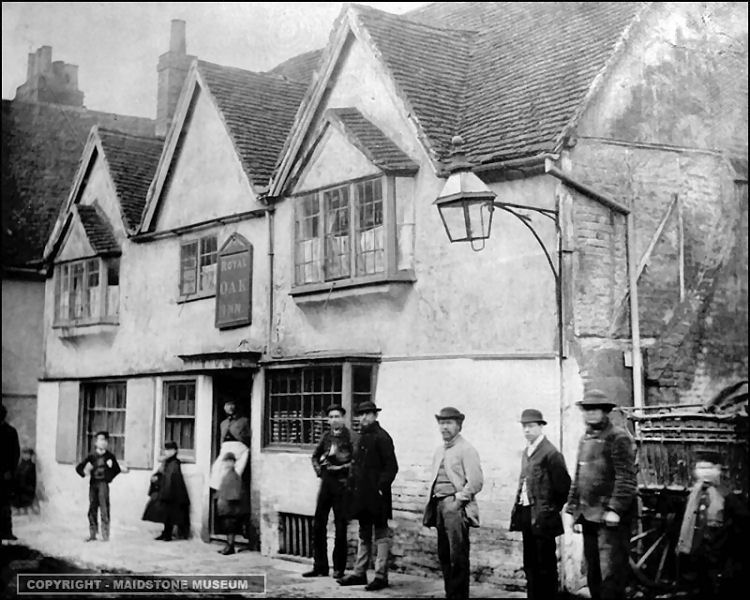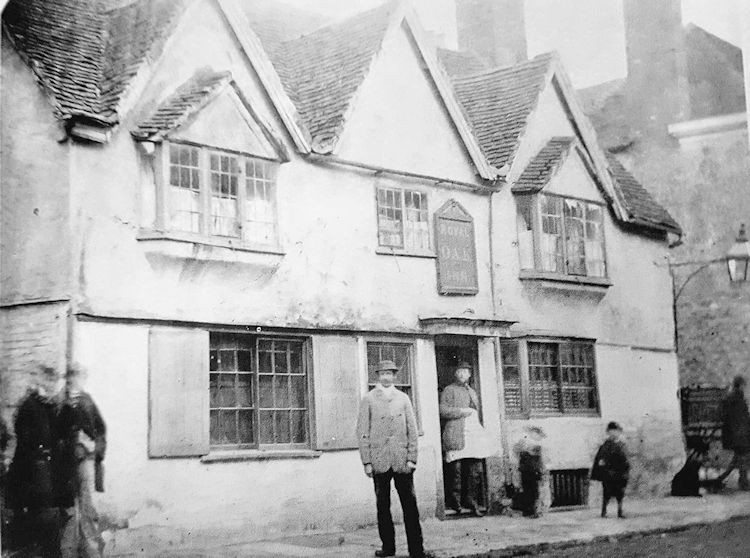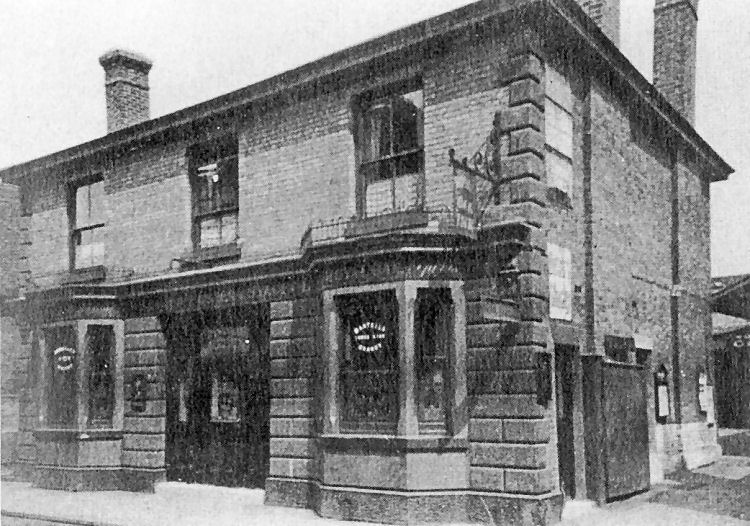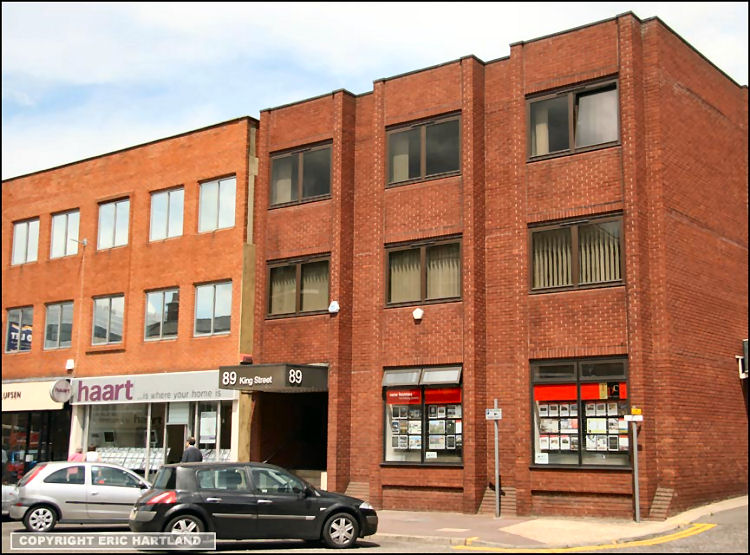|
89 (35 in 1851 ) King Street ) King Street
Wadhurst
Maidstone

Above photo, 1870, by kind permission of Eric Hartland. |

Above photo, date unknown. |

Above photo, circa 1929, believed to be the replacement for the original. |
 Above photo,
July 2008, by kind permission of Eric Hartland. |
I also have reference to another "Royal
Oak" addressed as in Hart Street, West Borough.
The "Royal Oak" was one of 4 inns in King Street during the last half of
the 19th Century. By 1929 a new Inn had taken the place of its predecessor
but in turn this new Inn closed its doors on 31 August 1975 leaving the
street without a single pub. The Scotch Provident House was built on the
site after the building was removed.
|
From Northampton Mercury, Saturday, July 3, 1830.
A few days ago a terrier puppy was discovered milking the udders of a
cow belonging to Mr. Symmons, Landlord of the "Royal Oak," in Maidstone.
The little milk filcher had latterly increased much in bulk, to the
surprise of its owner, who was ignorant of the source from which its
wants had been supplied. |
|
Maidstone Journal, 13 September, 1842.
CORONER'S INQUEST.
On Saturday last an inquest was held at the "Royal Oak," before F.
F. Dally, Esq , on the body of John Jude,
aged 77 years, who died suddenly in his own house on Friday night
last.
William Hadlow, servant at the "Royal Oak," stated that he had known
the deceased for several years who
had lately complained of a very bad cough. On Friday evening about 6
o’clock, deceased came to him with
some ingredients for his cough, which he mixed for him — deceased
took about a
teaspoonful and a half and then left. Shortly after witness was
called to by deceased's housekeeper, who
said that he had fallen down dead in his bed room. Witness went in
and found deceased on the floor lying
on his side quite dead. He immediately went for Mr. Day.
Thomas Day, Esq., surgeon, stated that he was called on by the last
witness on Friday evening last to attend
the deceased—he found him in his bed room on the bed, lying on his
back quite dead—he opened a vein in
the arm but very little blood flowed. Witness considered that the
deceased’s death was from a diseased
heart.
The jury returned a verdict "that the deceased died from natural
causes in a natural way."
|
|
Kentish Gazette, 13 May 1851.
Fatal Accident.
On Monday evening about nine o’clock a most melancholy catastrophe
occurred on Gabriel’s Hill, in this town, which resulted
in the death of the wife of Mr. Wm. Springett, thatcher, of East
Farleigh.
It appears that Springett, with his wife and their
daughter, with the infant child of the latter, and a woman named
Pankhurst, had been to the Bearsted Petty Session, where
the case in which they were engaged was finished about three o’clock,
and decided in their favour. They remained at the
public-house where the sittings are held till between seven and eight,
when they proceeded homeward in a low uncovered
van, or small wagon, drawn by a pony. On arriving at the "Royal Oak
Inn," they alighted and remained till about nine, when
all the party again got into the van, and started, Springett driving at
a very fast pace, so much so that on arriving at the top
of Gabriel’s Hill, he could not turn the pony to go down the hill, until
it had got some distance down High-street. They
continued at the same pace down Gabriel’s Hill until on arriving
opposite the shop of Mr. Thomas Haffenden, confectioner,
the wheels of the van appear to have come with such violence against the
kerb as to throw the whole party with frightful
force on the stones. The daughter and Mrs. Pankhurst, who were sitting
behind, were flung against the window of Mr.
Haffenden’s shop, breaking several panes of glass and one of the frames,
but not themselves sustaining serious injury.
Springett was thrown out in front, but escaped with only a few bruises.
Not so his unfortunate wife. On being lifted up she
appeared quite senseless. Mr. Joy and his assistant were instantly in
attendance, and rendered all the aid in their power, but
it was of no avail—the poor woman was dead. The distress of the husband
and daughter at this awful catastrophe may be
imagined. The body was taken to a room in the "Ship Inn." The cause of
death appears to have been the shock to the
nervous system, no external injury being discoverable. The deceased was
about forty years of age, and has left several
children to lament the awful event which has made them orphans.
|
|
South Eastern Gazette, 21 February, 1860.
Suicide of a Female by Hanging.
Information was received at the police station yesterday (Monday)
morning, that a woman named Charlotte Burr, wife of Thomas Burr,
labourer, residing with her father-in-law, George Simmonds,
carpenter, in the "Royal Oak" yard, Maidstone, had destroyed herself
by hanging.
It appears that she has for some considerable time past been
suffering from ill-health, and for the last six weeks has been
confined to her bed, during which time she has threatened to take
away her life, saying she "wished to get out of the world." She
repeated this threat on Sunday, and, notwithstanding her husband's
endeavours to bring her to a better frame of mind, she stated that
she was determined to carry it out. The husband got up on Monday
morning between seven and eight o’clock, to make her some tea, and
on his carrying this up he found her suspended to one of the rails
of the bed by his handkerchief. He was so weak himself from illness
that on his attempting to take hold of her he fell on the floor, and
this alarmed Simmonds, who ran up and cut her down, but life was
extinct. It is a singular circumstance that some years ago
deceased’s mother hung herself in a cupboard in the same room.
|
|
South Eastern Gazette, 21 February, 1860.
A Child Poisoned through a Mistake.
Last Saturday night an infant named Elizabeth Wren, aged eight
weeks, the daughter of Thomas Wren, papermaker, of Queen Ann-road,
Maidstone, was accidentally poisoned. The mother, it seems, had
intended to give it some Godfrey’s cordial and syrup of rhubarb, but
got a bottle containing laudanum in mistake, and gave some of it to
the child. The grandmother was present, and smelling the laudanum,
she snatched the spoon away, and threw the remainder of its contents
into the fire. Some warm tea was given to the child, with a view of
bringing up the laudanum, but the poor little thing getting very
drowsy, Mr. Sankey was sent for; and notwithstanding every exertion
on his part, the child died. An inquest will be held at the "Royal
Oak," on Wednesday, and it has been arranged to hold that on the
body of Mrs. Burr at the same time.
|
|
South Eastern Gazette, 28 February, 1860.
Coroner’s Inquests.
On Wednesday afternoon last two inquest were held at the "Royal Oak
Inn," King-street, Maidstone, before T. Kipping, Esq., coroner, the
first on the body of Elizabeth Wren, aged eight months, the daughter
of Thomas Wren, of Queen Ann-road, who met with its death by having
a quantity of laudanum administered to it in mistake, on the
previous Saturday; and the second on the body of Charlotte Burr,
wife of a labourer living in the "Royal Oak" yard, who hung herself
on Monday morning. No additional facts were elicited in either ease,
beyond those given in our last impression.
In the former, a verdict of "Accidentally poisoned" was returned,
the jury, through their foreman (Mr. J. Jennings) adding that
bottles which contained laudanum ought at all times to be kept
separate from other bottles.
In the case of Mrs. Burr, a verdict of "Temporary insanity" was
returned.
|
|
From the Maidstone Telegraph, Rochester and Chatham Gazette, Saturday 25 February 1860. Price 1d.
CORONERS INQUEST.
On Wednesday, an inquest was held at the “Royal Oak,” public house, on
the body of an infant, named Elizabeth Wren, aged eight weeks. Mrs. Wren, mother of the deceased, said, I live at No. 12, Queen Ann
Road. My infant was born on the 28th of December last. The child had
been healthy up to the time of his death, but had been rather fretful. I
had, at different times, been in the habit of giving the child a mixture
of laudanum, asafoetida, and peppermint, which had been recommended by a
friend of mine. On Saturday night, last, about a quarter past ten
o'clock, I intended to give it some Godfrey's cordial, and syrup of
rhubarb, together, but made a mistake in the bottle. I had bought it at
Mr. Wimble's chemist. I took down the bottle of laudanum from the
mantelpiece, in mistake, and gave the child nearly half a teaspoon full.
My mother was present at the time, and held the child in her lap. My
father was also present, and perceiving the child was fretful, persuaded
me to give it a little Godfrey. I then gave her about half a teaspoon
full. Mother smelt the laudanum when I gave it her, and I then threw the
remainder into the fire. The child had taken nearly half a teaspoon
full, as near as I can say. The child soon afterwards was sleepy, and
they let her sleep for about two hours. We thought she had not taken
sufficient to hurt her. I was not aware that would have been a dangerous
dose. The bottle was labelled “laudanum” and “poison.” We were in a
hurry when we gave it to the child, father was bothering then, and she
forgot to look at the bottle. Did not do anything to the child during
the two hours it slept. Mother was obliged to go out to market, and when
she returned she perceived the child was very ill, and sent for Mr.
Sankey, surgeon, directly. In a short time he came, the child was then
alive, and died about eight o'clock on the previous Sunday morning.
After the child had taken the laudanum, mother thought she was in a fit,
and the child drew herself up as if suffering. Mr. Sankey, surgeon, said, on Sunday morning, last, I was called in at
No. 12, Queen Ann Road, and see the child. It was then lying in the lap
of its Grandmother, and was very pale, the breathing was slow, and it
appeared to be in a sleep, quite motionless, could not be roused, and
insensible. The Grandmother told me that laudanum had been given to the
child, about half a teaspoon full, which had been given to it by
mistake. I saw the laudanum bottle, it was on the mantle piece, and the
other bottles were in the cupboard. The child appeared to be dying. I
first put my finger down its throat to make it vomit, but that was not
succeeding. I tried to give it some mustard and water, but the child did
not swallow it, it had lost all power of swallowing. I then threw some
sold water into its face, and rubbed it in front of the fire, and kept
up a respiration. I then gave a galvanic battery, and galvanised the
child about three hours, but without success. The child gave two or
three convulsive cries for an instant, and then went off again. I left
it at half-past five o'clock, and thought it must soon die. Had not the
slightest doubt as it its having taken the laudanum. One drop would have
been a dangerous dose, and two drops would be fatal, unless means were
taken at once to restore it. The bottle which contained the laudanum was here produced, which was
properly labelled, and the jury expressed their opinion that no blame
was attributable to the chemist. Mrs. Smith, the Grandmother of the deceased child was here called, but
her evidence was only in corroboration of her daughter's statement, and
the jury returned a verdict of “Accidental Death.” |
|
From the Maidstone Telegraph, Rochester and Chatham Gazette, Saturday 25 February 1860. Price 1d.
CORONERS INQUEST.
An inquest was held upon the body of Charlotte Burr, aged 35 years, who
destroyed herself by hanging, on Monday morning. Thomas Burr said, “I live in the “Royal Oak,” yard and I am a brewer's
labourer. I am the husband of the deceased. My wife had been ill about
six weeks and confined to her bed. During that period she had been up
about three times. She had been suffering from a liver complaint and her
mind appeared to be very much affected. On Sunday afternoon last she
said that she could not live in such agony and should make off with
herself. She had been attended by a medical man, and he had ordered that
she should be watched. I tried to persuade her not to make off with
herself. At times she appeared to be quite sensible and then would go
off in a very strange way. I went to bed on Sunday night between nine
and ten o'clock. During the night I awoke several times. My wife slept
with me. She did not, during the night, appear to be more strange than
usual. At about a quarter to seven on the following morning, I got up as
she asked me, to go down stairs and get her a cup of tea. I did so, and
took it up to her, she was then hanging in the room. It was then about a
quarter to eight. I did not cut her down, but I took hold of her body
and held her up, and cried out for help; deceased's father, George
Simmonds, came to my assistance, and cut her down. She was hanging by an
handkerchief. She was not quite dead when she was found, but died soon
afterwards. George Simmonds, father of the deceased, was also called, who fully
corroborated his son's statement. A verdict of “Temporary Insanity,” was returned. |
|
Kent Times, 22 February 1862.
Suspicious Death of an Infant
On Sunday morning last information was received at the
police-station that a child had been found dead by the side of its
mother, who, as was supposed had by accident overlain it. Since
then, however, circumstances have transpired which will appear to
render the case one of great suspicion. The father of the child is a
labouring man, who has since Christmas, and up to within the last
fortnight been out of employ. A fortnight ago, however, he obtained
work at a considerable distance from home. The family, consisting of
the wife and four children (all twins), two having been born about
five years since, and the other two being nine months old, had been
in great distress, having no one to assist them. On Saturday night
Mrs. Todd, the mother, who lived in a cottage in the "Royal Oak"
yard, went to bed shortly after twelve o’clock, her sister-in-law,
who lived in the same house, assisting her in carrying up the
children; when they had all got into bed she suckled both the
children and then went to sleep, awaking once in the course of the
night, when she gave the breast to the deceased child.
Mark Todd; she again awoke about five o'clock, and then the other
infant had the breast. About seven o'clock or shortly before that
hour, she awoke, and she then found that Mark was lying partially on
his face, she turned him over and then ran out of the room and
called her brother and sister, the child was quite dead. Her brother
on seeing the child, asked what he should do, and, she desired him
to fetch her mother, which he did. The mother came directly, and by
her advice, a doctor was called in, who found the child dead. There,
were no strings about the clothing of either the mother or the
child, which could by accident have got round its neck. He wore a
bed-gown, which had a narrow piece of white cord to fasten it
loosely round the neck, while her bed-gown, she having to suckle
the two of infants, had no fastenings to it, except at the wrists.
The child was a strong, healthy boy, and had never been troublesome.
There was nothing in the bed that could by any accident have
strangled the child. When she awoke at five o’clock in the morning,
she did not notice the child, Mark, and could not say whether at
that time Mark was alive or dead. Thus for the statement of the
mother, a portion of which, that relating to the calling of her
mother and the fetching the doctor, is confirmed by her brother. The
medical gentleman, however, entirely ignores the opinion that death
was caused by the mother accidently overlaying the child. Mr. Furber
says, when he a was called in he found the deceased lying on his
back in the bed. Its face was much congested and its tongue slightly
protruded, the face, however, was calm; he fancied from the
appearance that the child, had been suffocated; its head appeared to
have been partially tuned round and then pressed down upon its
chest; there was a deep mark round its neck as if a piece of tape
had been tied tightly round it; this groove was nearly half an inch
in width, and a quarter of an inch 1 in depth; he subsequently,
assisted by Mr. Seally, another medical gentleman, made a post
mortem examination of the body; he found the stomach perfectly
healthy, as was also the brain; the veins, all round the neck where
the groove was were very much congested and presented a very
different appearance to the surrounding parts of the neck. The skin
under the groove also felt very differently to the other skin. The
lungs in the cavity of the chest and the heart were much congested.
The appearances he saw were most decidedly not natural, nor could
they have been caused accidentally by anything the child or mother
wore. They were evidently caused by a piece of tape, as the edges of
the tape were strongly defined about the neck. When he first saw the
child the skin was quite warm, but he had evidently been dead three
or four hours.
The whole of these circumstances having been made known to the
coroner, that gentleman thought it incumbent upon him to hold an
enquiry, and on Tuesday evening an inquest was held at the "Royal
Oak Inn," before Mr. Kipping and a highly respectable jury, when
after hearing evidence: as above, and a few observations from the
learned coroner, it was decided to adjourn until Friday evening.
|
|
From Chatham News 19 December 1863.
MAIDSTONE. SHOCKING DEATH.
On Saturday morning, the ostler at the "Royal Oak," King Street, left his bed-room over the stables. On lifting the trap-door to
descend, he was alarmed by the dead body of a man falling to the ground.
It was then found that a drunken man named "Jack Simmonds," had gone
into the stables for a night's lodging, as he had done before, and being
very tipsy, the door had fallen and caught him by the neck. He would
appear to have lost his footing at the same moment, and, no doubt. was
instantly killed by hanging. An Inquest was held; verdict," Accidental death."
|
|
From Lloyd's Weekly Newspaper (London, England), Sunday, November 19,
1871; Issue 1513.
ACCIDENT TO A LICENSED VICTUALLER.
Mr. G. Usmar, the proprietor of the
"Royal Oak," Maidstone, was hunting over the estates of the Earl of Romney
on Monday, when one of the party, in shooting at a rabbit, accidentally
lodged the contents of his gun in Mr. Usmar's eye. The bullet traversed
the flesh for some distance, and although Dr. Adams was soon in
attendance, he was unable to extract it. The unfortunate gentleman will
most probably lose the sight of the injured eye, if, as is feared, more
serious consequences do not ensue. N.B. Possible death occurred between July & Sept 1878, so he lived a few
more years. From Free BMD Death Sept Qtr. 1878 Maidstone. George Usmar
aged 57. |
Local knowledge, further pictures, and licensee information would be
appreciated.
I will be adding the historical information when I find or are sent it,
but this project is a very big one, and I do not know when or where the
information will come from.
All emails are answered.
LICENSEE LIST
SIMMONS Thomas 1828-51+ (age 65 in 1851 ) )
  
USMAR George 1867-71+ (age 49 in 1871 ) )

USMAR William 1882+
COOK W 1891+
STAPLEY William 1903-11+ (age 61 in 1911 ) )

USHERWOOD Fred 1929+
COATES Geoff & Teresa Aug-Dec/1974
https://pubwiki.co.uk/RoyalOak.shtml
 From the Pigot's Directory 1828-29 From the Pigot's Directory 1828-29
 From the Pigot's Directory 1832-33-34 From the Pigot's Directory 1832-33-34
 Census Census
 Kentish Gazette Kentish Gazette
 From
the Post Office Directory 1867 From
the Post Office Directory 1867
 From the Kelly's Directory 1903 From the Kelly's Directory 1903
|



